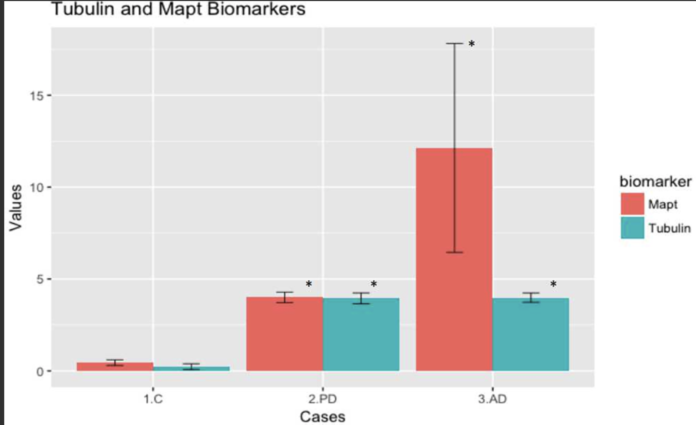Neurodegenerative diseases including Alzheimer’s disease (AD) and Parkinson’s disease (PD) are characterized by progressive neuronal loss and pathological accumulation of some proteins. Developing new biomarkers for both diseases is highly important for the early diagnosis and possible development of neuro-protective strategies. Serum antibodies (AIAs) against neuronal proteins are potential biomarkers for AD and PD that may be formed in response to their release into systemic circulation after brain damage. In the present study, two AIAs (tubulin and tau) were measured in sera of patients of PD and AD, compared to healthy controls. Results showed that both antibodies were elevated in patients with PD and AD compared to match controls. Curiously, the profile of elevation of antibodies was different in both diseases. In PD cases, tubulin and tau AIAs levels were similar. On the other hand, AD patients showed more elevation of tau AIAs compared to tubulin. Our current results suggested that AIAs panel could be able to identify cases with neuro-degeneration when compared with healthy subjects. More interestingly, it is possible to differentiate between PD and AD cases through identifying specific AIAs profile for each neurodegenerative states.
Salama M, Shalash A, Magdy A, Makar M, Roushdy T, Elrassas HH, Mohamed WM, El-Balkimy M, Abou-Donia MB 2018. Tubulin and Tau: possible targets for diagnosis of Parkinson’s and Alzheimer’s diseases. PLoS ONE 13(5): e0196436.
Institute of Global Health and Human Ecology, American University in Cairo, Egypt
Dr Mohamed Salama established the first Translational Neuroscience Unit in Egypt. Mohamed’s collaborative research led to establishing the Egyptian Network for Neurodegenerative Disorders (ENND). Mohamed was selected as a SOT Global Senior Scholar in 2013 and Translational/bridging awardee in 2016. He was awarded by Parkinson’s and Movement Disorders Foundation (PMDF) for his continuing research in the field of neurodegeneration.
Recently, Mohamed and his colleagues succeeded to draft the first Reference Egyptian Genome and collaborating with other colleagues to start a national cohort (A Longitudinal Study of Egyptian Health Aging [AL-SEHA]). Currently, Mohamed is Atlantic senior fellow for Equity in brain health at the Global Brain Health Institute (GBHI) and Associate professor at the Institute of Global Health and Human Ecology at the American University in Cairo (AUC).



